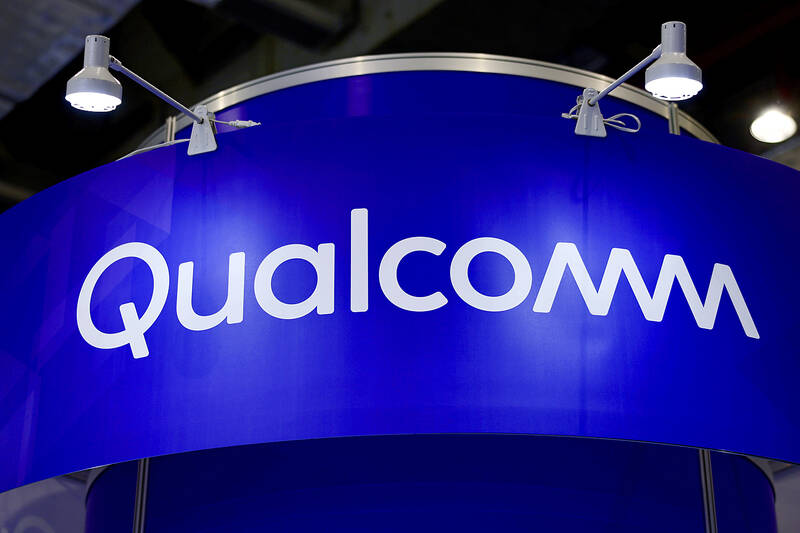Qualcomm Inc, the biggest maker of chips that run smartphones, slid in early trading yesterday after giving a tepid revenue forecast a day earlier, underscoring concerns that tariffs would hurt demand for its products.
Revenue in the period ending in June would be US$9.9 billion to US$10.7 billion, the company said in a statement on Wednesday. The midpoint of that range was slightly below the average analyst estimate of US$10.33 billion.
The outlook renewed fears that the market for smartphones would suffer from a looming trade war. Qualcomm is seen as highly vulnerable to the fallout from tariffs threatened by the US and China.

Photo: Ritchie B. Tongo, EPA-EFE
China is the biggest market for Qualcomm’s chips, and local phone makers are many of its top customers.
“As we navigate the current macroeconomic and trade environment, we remain focused on the critical factors we can control — our leading technology road map, best-in-class product portfolio, strong customer relationships and operational efficiencies,” Qualcomm CEO Cristiano Amon said in the statement.
The shares fell more than 5 percent in premarket trading in New York yesterday following the announcement.
Qualcomm has not yet experienced any material impact from tariffs, and its Chinese customers are continuing to design products based on its chips, Amon said on a conference call with analysts.
While there has been no direct effect, the indirect fallout from tariffs cannot currently be predicted, Qualcomm chief financial officer Akash Palkhiwala said.
Earnings in the June quarter would be about US$2.70 a share, excluding some items, Qualcomm said. That compares with a Wall Street projection of US$2.64.
The San Diego-based company has projected that the smartphone market would grow by a percentage in the low single digits this year.
In the March quarter, profit was US$2.85 a share, excluding some items. Revenue rose 17 percent to US$11 billion. Analysts had estimated earnings of US$2.81 a share and sales of US$10.6 billion.
Phone-related sales were US$6.93 billion, compared with the average projection of US$6.8 billion. Revenue of chips used in vehicles was US$959 million. Connected-device semiconductor sales were US$1.58 billion.
Qualcomm supplies processors and modems that are the main components of the world’s most advanced smartphones. While that market is no longer growing as quickly as it once did, the company’s products are widely used in high-end Android phones.
The chipmaker also collects fees calculated as a percentage of the cost of a handset regardless of whether the phone maker uses its chips.
Under Amon, Qualcomm has been trying to reduce its reliance on the phone market with a push into new areas. That includes selling chips to automakers and offering new processors that it says are the best foundation for new artificial intelligence laptops.

CHIP RACE: Three years of overbroad export controls drove foreign competitors to pursue their own AI chips, and ‘cost US taxpayers billions of dollars,’ Nvidia said China has figured out the US strategy for allowing it to buy Nvidia Corp’s H200s and is rejecting the artificial intelligence (AI) chip in favor of domestically developed semiconductors, White House AI adviser David Sacks said, citing news reports. US President Donald Trump on Monday said that he would allow shipments of Nvidia’s H200 chips to China, part of an administration effort backed by Sacks to challenge Chinese tech champions such as Huawei Technologies Co (華為) by bringing US competition to their home market. On Friday, Sacks signaled that he was uncertain about whether that approach would work. “They’re rejecting our chips,” Sacks

It is challenging to build infrastructure in much of Europe. Constrained budgets and polarized politics tend to undermine long-term projects, forcing officials to react to emergencies rather than plan for the future. Not in Austria. Today, the country is to officially open its Koralmbahn tunnel, the 5.9 billion euro (US$6.9 billion) centerpiece of a groundbreaking new railway that will eventually run from Poland’s Baltic coast to the Adriatic Sea, transforming travel within Austria and positioning the Alpine nation at the forefront of logistics in Europe. “It is Austria’s biggest socio-economic experiment in over a century,” said Eric Kirschner, an economist at Graz-based Joanneum

BUBBLE? Only a handful of companies are seeing rapid revenue growth and higher valuations, and it is not enough to call the AI trend a transformation, an analyst said Artificial intelligence (AI) is entering a more challenging phase next year as companies move beyond experimentation and begin demanding clear financial returns from a technology that has delivered big gains to only a small group of early adopters, PricewaterhouseCoopers (PwC) Taiwan said yesterday. Most organizations have been able to justify AI investments through cost recovery or modest efficiency gains, but few have achieved meaningful revenue growth or long-term competitive advantage, the consultancy said in its 2026 AI Business Predictions report. This growing performance gap is forcing executives to reconsider how AI is deployed across their organizations, it said. “Many companies

France is developing domestic production of electric vehicle (EV) batteries with an eye on industrial independence, but Asian experts are proving key in launching operations. In the Verkor factory outside the northern city of Dunkirk, which was inaugurated on Thursday, foreign specialists, notably from South Korea and Malaysia, are training the local staff. Verkor is the third battery gigafactory to open in northern France in a region that has become known as “Battery Valley.” At the Automotive Energy Supply Corp (AESC) factory near the city of Douai, where production has been under way for several months, Chinese engineers and technicians supervise French recruits. “They